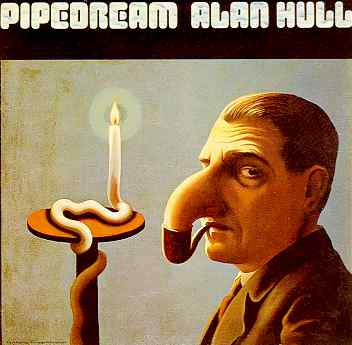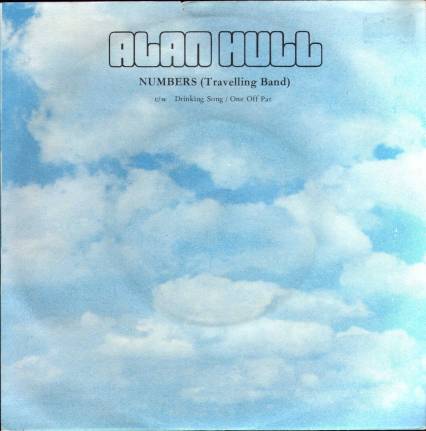ALAN HULL, who has led Lindisfarne a stormy path across the other side of the world, is back in Barnet - the Mecca of the north if you discount Newcastle. Over dinner last week Hully successfully extricated the band from the large question mark which has been looming over its head since the American tour at the back end of last year.
Did the band break up? Was Hully off on a solo career? Were Lindisfarne coming off the road to let things sort themselves out? There's an element of truth in all these rumours, and although the band are making plans for a grand reunion in early summer there are plenty of indications that there is still a lot of ironing out to be done.
The most positive aspect of the band's immediate future is that Alan Hull is recording a solo album at Trident studios beginning on March 19, and that won't come as much of a surprise to Lindisfarne fans any more than his wish to embark on more solo exploits.
A far greater paradox is that much of the material predates "Lady Eleanor" and "We Can Swing Together" and was written during 1968 and 1969 - Hully's most prolific writing period.
He cut innumerable demos at Dave Wood's Impulse Studios in Newcastle, most of which he's referred back to this year in order to select cuts for the new album.
He's virtually succeeded in pruning down an album's worth of material and we listened to the tapes over a splendid meal, a bottle of plonk and some vin rouge. Needless to say the thread that links most of the material together is drink and it's uncanny that Hully's impressions of this wicked world have changed remarkably little in five years.
"I've always wanted to record solo and I've got lots of material; in the past it's always been with Lindisfarne but I've never had the chance to do anything on my own before and there's several different things I want to get out
musically."
He indicated that far from being an album of Alan Hull with Lindisfarne, the album will feature a number of musicians - mostly Geordies that Hully's known for years. Ray (Laidlaw) is going to be doing the drumming because he's dead sympathetic but it's going to be quite different from Lindisfarne.
"Colin Gibson, whom I've known for many years, will be on bass, Kenny Craddock will play piano and guitar and I'll probably be adding another guitarist. Jacka will be doing a few things on mandolin and harmonica and there'll also be a few orchestral things."
Hully's come up with some great melodies exploited on guitar and piano, and some basic, succinct lyrics featuring a typical Alan Hull economy of words. "Drinking Song", for instance, expresses his sentiments perfectly."I've always known what material would work with Lindisfarne and what wouldn't and the reason that I'm recording so much old stuff is because they're songs that I really like, and I've not been writing as much as I'd like to lately - there's a few new things but I just want it to be an album of good songs well done.
"For instance I like Bowie for his music - I never think about him for the way he projects himself on stage, that's why I want mine to be purely an album of good
music."
Alan looks back fondly to 1969, the year in which he wrote some fifty fine songs.
"'Lady Eleanor', 'Winter Song', 'Fog On The Tyne' and 'We Can Swing Together' all came from that period - in fact 'Country Gentleman's Wife' I used to do as an encore in the folk clubs - it's a bit dirty and it used to go down better than 'Fog On The Tyne' and 'We Can Swing Together'."
Hully maintains that there is a continuity running through the songs although they span a five year period.
"The old songs are a bit more introspective and lonely whereas the newer ones are a bit more lively and more like band songs. But I think they're all protest songs to a degree - and I think Bowie's are too in a
sense."
 'Drinking
Song', he says used to be particularly popular in Newcastle "because everybody knows they're the best drinkers in the
world."But why the preoccupation with drinking songs? "Because it's a great experience and a wonderful tradition. Not only that but it's good to write about it because it's like a homage to something joyful - it's something I know about because I
drink."
'Drinking
Song', he says used to be particularly popular in Newcastle "because everybody knows they're the best drinkers in the
world."But why the preoccupation with drinking songs? "Because it's a great experience and a wonderful tradition. Not only that but it's good to write about it because it's like a homage to something joyful - it's something I know about because I
drink."
Mickey Sweeney and Ken Scott will be producing Alan's album and in the meantime the rest of the band are off on a working holiday, resting up and trying to get some new material together at the same time.
"We'll be off the road until about May I should think. We've been away from England a long time deliberately because I didn't want to start repeating things. We won't be neglecting Britain but when we start playing here again I want it to be like it was in Australia and Japan because I don't think we've ever played better."
The band plan to clean out some of the older material to make way for the new but Alan emphasised that old Lindisfarne favourites will be retained although they will probably be projected in an entirely different way.
"I think Jacks will be doing a lot more in the new set up because he's great on stage and was very popular in Japan and Australia. In fact it's a bit like Jacka and the Deadmen on
stage."
Alan was surprised that the band's second American tour - the one designed to break the band - had misfired, but possibly by this time the act was beginning to go stale.
"It just didn't seem to come off at all - they don't seem to be ready for us at the moment although Dr Hook are apparently more like us."
Did the band almost split up as a result? Alan was understandably cagey.
"There was a chance of the band changing but not exactly splitting", he pondered. "I mean there'll always be a Lindisfarne."
A good rest and a good stage act is what the band need right now, says Alan, and then they'll be back with a vengeance.
"I'll be doing some solo things but they won't be of great importance - it's much better to be playing with a band," he says.